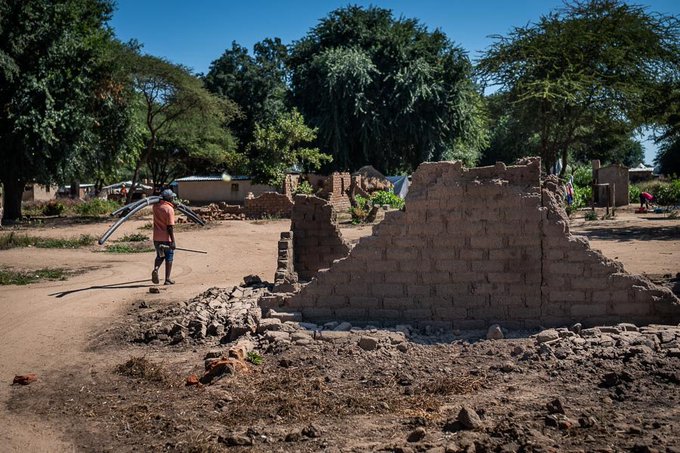By Joyce Mukucha
The African Development Bank (AFDB) in partnership with the World Bank launched a Zimbabwe Idai Recovery Project (ZIRP) and the Idai Emergency Recovery and Resilience Project (IERRP) in an effort to bring profound relief in the affected areas.
The World Bank provided a $72 million grant for the ZIRP which will provide immediate support from the most affected communities across nine districts. In partnership with the Government of Zimbabwe, the AFDB will fund $24, 3 million which is meant to focus on public infrastructure and capacity building. ZIRP will focus on the rebuilding community infrastructure and re-establishing livelihoods through cash transfers, restoring agricultural crops and livestock production, and invigorating basic healthcare services.
In his remarks read on his behalf on the 2nd of September 2019 in Harare by the AFD Country Economist Mr Walter Odero, the AFDB Regional Director Mr Kapil Kapoor, said the Post Cyclone Idai Project will focus on rebuilding key infrastructure across Zimbabwe.
“We must acknowledge that these projects are rolled out at a time when underlying macro-economic shocks have the potential to impact on the various implementation initiatives. The AFDB is funding the $24.3 million project that will help restore essential services including transport, electricity, water and sanitation to the most severely affected communities in the districts of Chimanimani and Chipinge in the Province of Manicaland. The United Nations Office for Project Services (UNOPS) will manage the project working with other UN Agencies namely FAO, UNICEF, WFP, and WHO,” he said.
Kapoor highlighted that UNOPS was also going to work closely with the Government of Zimbabwe to implement the IERRP to increase the government’s capacity to manage emergencies in the future. The joint launch, he said, lessens the burden of coordination between government beneficiary entities and AFDB, World Bank and the United Nations Office for Projects as it works to avoid duplication of efforts and resources to address the calamity that befell the country in particular the districts of Chimanimani and Chipinge.
“Together with our various partners with Government, we will work expeditiously to bring a smile to the affected communities in Chimanimani and Chipinge, and the country at large. Allow me the opportunity to mention that the AFDB is in addition planning to contribute $ 0.7 million to a project under the Africa Disaster Risk Financing (ADRIFI) to address Climate Risk Management Solutions and Supporting Access to Sovereign Risk Transfer Solutions. As you may also recall, AFDB responded to the effects of the Cyclone by approving USD 250, 000 from our Special Relief Fund, to aid in humanitarian response,” said Kapoor.
Given the extent of the damages caused by the Cyclone, Kapoor said totalling USD 24.3 million, the resources have been mobilised from Transitional Support Facility and Regional Resources Envelopes with Government co-financing commitment to this project in the tune of USD 3.2 million to make a total of USD 27,5.
Ede Ijjasz-Vasquez, the World Bank Regional Director for Social, Urban and Rural Resilience said through these unique partnerships, they hoped to contribute to how national and regional authorities, development and humanitarian n partners can and must work together in providing critical development assistance. Ijjasz emphasised that he felt honoured to have joined hands with AFDB to grant support to Zimbabwe and insisted that the project must be implemented hastily to address the calamities that befell the nation.
“We are very pleased to be here today as we join hands to launch these projects. Ensuring integrated and coordinated support for affected communities, this project will assist in the renewal of livelihoods with a focus on building back smatter and longer-term resilience building. Let’s use every disaster as an opportunity to strengthen and build and deepen development in the future. It is everyone’s responsibility to ensure that those communities are supported,” he said.
The Minister for Local Government, Public Works and National Housing, Hon. July Moyo said the launch of the ZIRP and IERRP gave impetus and traction to the recovery stretch, where the government will work with partners from the private sector, World Bank, AFDB, DFID, People’s Republic of China, Republic of South Africa, EU, the UN among others to assist the affected communities to build resilience.
The two new multi-sector projects launched with financing from the World Bank and the ADBF are to be implemented through UNOPS.
Cyclone Idai struck Zimbabwe in March 2019, causing extensive damage worth an estimated $622 million. Over 50, 000 households were destroyed, directly affecting 271,000 people including 60,000 who were displaced. Now, it is reported that up to $1.1 billion is needed to support Zimbabwe’s recovery and restore damaged infrastructure and livelihoods.
